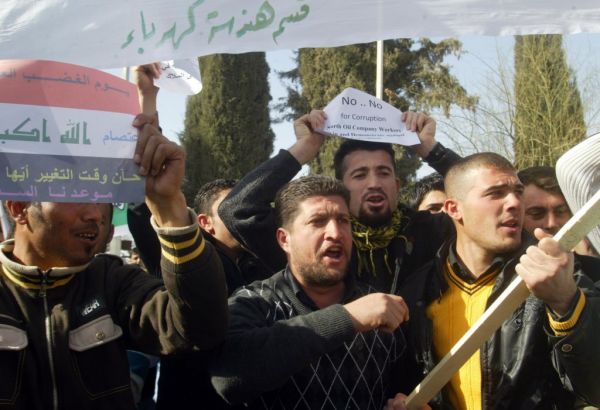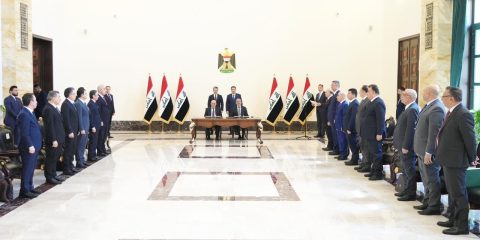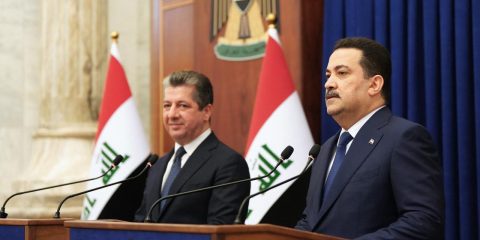Oil workers face retribution
The Iraqi government is imposing fines and forced relocations on oil unionists who have rallied workers for improved conditions.
KIRKUK - Unionists in Iraq's oil sector have been fined and days ago were relocated to remote locations as part of a campaign of seeming retaliation against their role in organizing workers.
Jamal Abdul-Jabbar Akram, president of the Oil and Gas Workers’ Union of the General Federation of Iraqi Workers (GFIW), said he has been transferred after his organization staged a February rally outside the headquarters of the state-owned North Oil Company (NOC).
In a separate incident, according to a ministerial order issued in February, recently obtained by Iraq Oil Report, Oil Minister Abdul Karim Luaibi fined 16 workers nearly $60,000 for a March 2010 work stoppage at the Basra refinery. Days after that strike, workers involved were transferred from Basra to Baghdad.
It's not clear if the stated fine is the total amount or the per-person fee.
Iraqi workers in the public sector are forbidden from forming unions not formally sanctioned and controlled by the state, a regulation remaining since the Saddam Hussein era.
Iraq is a signatory to international workers rights agreements, and the 2005 constitution has called for a new labor law. A draft has languished in the political process. Oil workers – along with teachers, dockworkers and others – have formed unions nonetheless.
The oil unions have stopped or threatened to stop production and have held rallies over issues like legislation, pay and treatment. In response, they have been targeted by security forces and members have had warrants issued for their arrest or been relocated to areas away from their families.
"We have demanded the appointment of temporary staff (to be made permanent employees), and disburse payments, housing, food and launch training sessions for the benefit of oil company's associates outside the country and improve the salaries of company's associates," Akram said.
A committee comprised of the NOC and security officials at the Oil Ministry questioned Akram recently and gave him a warning not to continue workers' rights activities. Soon after, they made good on their threats.
"I was informed (Sunday) with a ministerial order to relocate me from the North Oil Company to another location," Akram said.
In a letter to the Iraqi government, Manfred Warda, general secretary of the Geneva-based International Federation of Chemical, Energy, Mine and General Workers' Unions, of which the Iraqi GFIW is an affiliate, called on the government to end "escalating trade union repression."
"Rather than persecuting Iraqi citizens for engaging in their fundamental human rights, the government must institutionalize free and independent trade unions in a modern labor law for peace and prosperity of all Iraqis,” Warda wrote.
The Oil Ministry has refused to recognize the unions officially, citing their lack of legal grounding, and declined to comment on the recent measures taken against unionists.
"We have no information about unions or oil worker issues," a ministry press spokesperson said. "There is still no legislation to arrange for the work of the workers' unions."
The NOC protest that earned the ministry's ire aimed to obtain full-time employment for 3,800 contract employees currently working without the pay, training, and benefits given to full-time staff, according to Shirzad Majid Karim, who is Akram's deputy at GFIW.
Similar demonstrations have swelled throughout the southern province of Basra, which carries the bulk of Iraq's 2.6 million barrels per day (bpd) of production and 2.2 million bpd of exports. Oil workers have been protesting myriad issues including pay and bonus allocation. Farmers also have cried foul over alleged lax compensation for land use.
After protests there earlier this month, contract workers of the Oil Police won the rights to full-time employment.
Complaints about pay and working conditions also animated the protests at Basra refinery in March 2010, for which workers are now being punished. Luaibi's order accuses the workers of "damage to the public fund because the refinery stopped for 17 hours because of the protests. The stopping was in the operating, receiving and producing units."
Workers say the refinery was not shut for 17 hours.
Iraqi staff contributing from Baghdad are anonymous for their security. Ben Lando contributed from Erbil and Ali Abu Iraq contributed from Basra.





